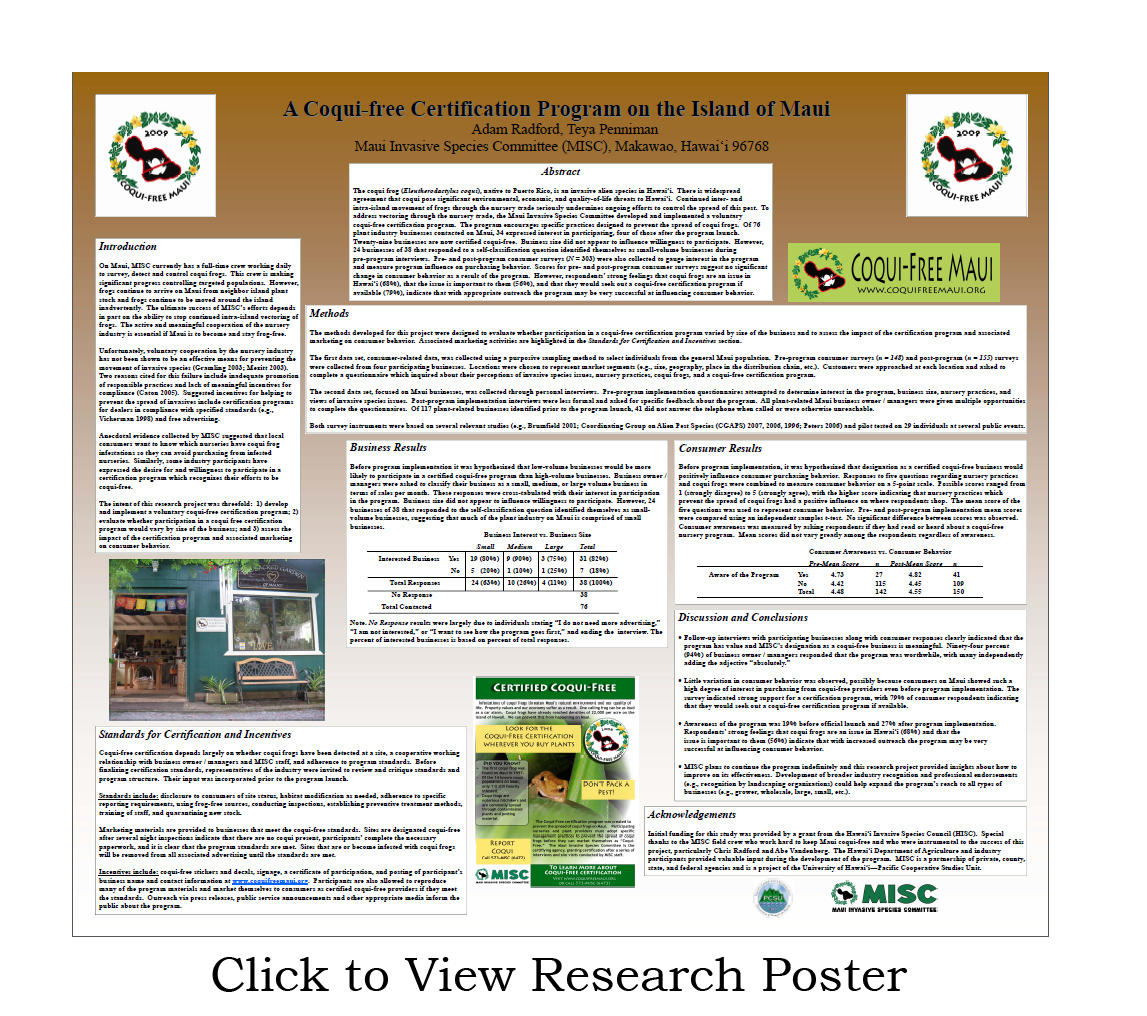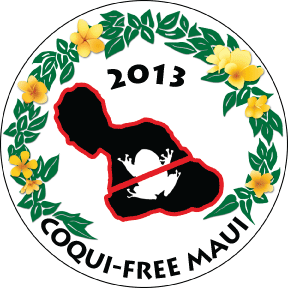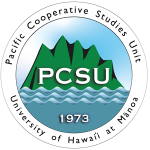Why Coqui-free?
The “Coqui-free” certification program for the island of Maui is a pilot program designed to prevent the spread of coqui frogs via the plant trade. The program is based on following voluntary codes of conduct for plant providers. If you see a business designated as “Coqui-free,” you can feel confident that you will not be moving coqui frogs to your neighborhood or place of business when purchasing plants or plant products.
The objective of the “Coqui-free” certification program is to encourage industry participants to adopt specific practices to prevent the spread of coqui frogs on Maui. Participating businesses receive free advertising and can market themselves to the public as certified “Coqui-free” if they meet specific standards. Businesses are certified “Coqui-free” after interviews and site visits conducted by Maui Invasive Species Committee (MISC) staff
Research
The “Coqui-free” certification program was initially funded by the Hawaii Invasive Species Council. This funding allowed MISC to develop the standards for participation, conduct regular site inspections and interviews with participant businesses, produce a variety of advertising products, and conduct related research. The research attempted to determine the level of interest businesses shown in the program and the program’s impact on purchasing behaviors.
Before the program was implemented, surveys and interviews were conducted at a variety of businesses to determine practices related to coqui frogs, understand perspectives on invasive species issues, and get a sense of both plant-related business and consumer practices on Maui. Post-implementation surveys were also collected to see if there was any significant change in consumer behavior after the program launch and to determine if people became aware of the certification program. Aggregate results of this research are available in the online poster: A Coqui-free Certification Program on the Island of Maui.
Industry representatives were invited to review research findings and critique the proposed “Coqui-free” program prior to implementation. Their input was incorporated into the final certification standards and program structure.
Protocols for Participating Businesses
“Coqui-free” certification depends largely on whether coqui frogs have been detected at a site. Sites with coqui frogs may become “Coqui-free” after meeting the following standards. Sites that become infested with coqui frogs after certification will be removed from all associated advertising until the standards are met.
Certification Process
All plants and nurseries will undergo inspection of the site prior to designation. Some inspection may occur in the day, but final inspections will occur in the evenings when coqui frogs are most active.
No Coquis Detected on Site
To be designated “Coqui-free,” a participant must meet the following standards:
- No frogs are detected by MISC personnel at the site or nearby during night-time surveys
- Meaningful efforts are made to use products and materials from frog-free sources. Acceptable meaningful efforts will include at least two of the following: Development of a staging area when receiving new plant material
- Disclosure of plant sources and volume of plant sales to MISC
- Inspection of plants and/or plant material prior to sale
- Operating as a repository for coqui reports and passing along all relevant information within one week of the report to MISC
- Distributing citric acid (provided by MISC) to customers who believe they have coqui frogs
- Reporting any coqui frogs to MISC within 24 hours of the incident
- Regular physical inspections of all stock and night-time surveys have detected no evidence of coqui frogs or eggs within the last three months
- New stock is thoroughly inspected and / or sprayed with an approved agent ( citric acid), or treated with hot water (113°F for 5 minutes or more), or quarantined at the site before sale to consumers, or monitored at night for the presence / absence of coqui frogs
- Frog-friendly habitat is eliminated by trimming and cleaning dead leaves, removing rubbish in pots, and removing non-stock vegetation or supplies that could create frog-friendly habitat
- All staff is trained in coqui-frog identification and control techniques during initial surveys and re-trained at least once a year
- Action steps are documented on approved forms
Coqui Detected at Site
At sites where coqui frogs have been detected within the last three months, a participant may receive a “Coqui-free” certification after meeting the following standards:
- Any frog detections are reported to MISC within 24 hours
- Regular physical inspection by MISC staff of facilities and all plant material will occur at least every four to six weeks
- Inspections reveal that no frogs or frog eggs are detected by MISC personnel, participants and their employees, customers, or neighbors at the site or nearby during night-time surveys
- Meaningful efforts (see bullet 2 of the previous section) are made to use products and materials from frog-free sources
- Participant will develop and implement a treatment plan in cooperation with MISC
- The entire infested area is treated on a regular schedule with an approved pesticide ( citric acid), hot-water treatment (113°F for 5 minutes or more), hand capture technique, or combination of methods
- New stock is thoroughly inspected and sprayed with an approved agent (citric acid), or treated with hot water (113°F for 5 minutes or more), or quarantined for two weeks at the site before sale to consumers, and monitored at night for the presence / absence of coqui frogs
- Frog-friendly habitat is reduced by removing unwanted piles of plant debris, and eliminated by trimming and cleaning dead leaves, removing rubbish in pots, and removing non-stock vegetation or supplies that could create frog habitat
- A buffer zone is created around infested areas and movement or sale of infested materials will not occur
- The presence of coqui frogs at the site is disclosed to consumers who are encouraged to inspect plants prior to leaving the nursery and quarantine plants before planting at a new site
- All staff is trained by MISC personnel in coqui-frog identification and control techniques and retrained at least once a year
- Action steps are documented on approved forms
A “Coqui-detected” site may become certified “Coqui-free” after three months with no coqui frogs detected at the site. MISC will notify nurseries of site status in a timely manner and provide the “Coqui-free” marketing materials once three months have passed with no coqui frogs detected at the site. Participants must notify MISC if coqui frogs are found on-site and refrain from marketing themselves as “Coqui-free” until three months have passed with no coqui detected.
Marketing Incentives
 Surveys have shown that local consumers want to know which plant providers and nursery retailers are working to prevent the spread of coqui frogs. Similarly, some industry participants have expressed the desire for and willingness to participate in a “Coqui-free” certification program.
Surveys have shown that local consumers want to know which plant providers and nursery retailers are working to prevent the spread of coqui frogs. Similarly, some industry participants have expressed the desire for and willingness to participate in a “Coqui-free” certification program.
- A program logo, updated each year
- Stickers bearing the logo of the “Coqui-free” certification program (available for reprint by certified businesses)
- A banner advertising certification
- A letter of certification for display at the place of business
- Informational handouts and brochures (available for reprint by clicking below)
Advertising will include:
- Listing the names and contact information of certified businesses on this website
- Press releases and public service announcements about the program
If interested in the marketing materials associated with the “Coqui-free” certification program contact Lissa Strohecker (miscpr@hawaii.edu) at the Maui Invasive Species Committee (808-573-6472).




